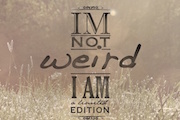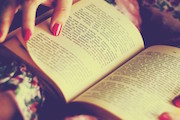It's that time of year when your teachers are starting to expect a little bit more out of your work. Your English teacher might even be working to help you analyze novels or poetry by teaching you about literary terms and devices. Well, here's your cheat sheet; check out some of the most common literary devices you need to know for English class.
Alliteration
- Alliteration describes how a sentence sounds. If most of the words in a sentence start with the same letter or sound, alliteration is being used.
- For example, the sentence "The most magnificent month is March" features mostly words that start with the letter "m".
- Alliteration is probably most useful when analyzing or writing poetry.
 Alliteration all around!Courtesy of virtualspeechcoach.com
Alliteration all around!Courtesy of virtualspeechcoach.com
Metaphor
- A metaphor is commonly used to compare two things. It's one of the most frequently mistaken literary devices; I can pretty much guarantee that you will be tested on it at some point, so make sure you know what it is!
- A metaphor shows how two things are alike by taking comparison one step further; instead of saying one thing is like another, in a metaphor one thing is actually said to be another
- For example, the sentence "This classroom is a zoo" is a vivid way of describing the atmosphere of the classroom. It suggests that the classroom is a wild place, and the children wild animals!
 "Time is money" is a metaphor you've probably heard before. Courtesy of commercialbridgeloan.org
"Time is money" is a metaphor you've probably heard before. Courtesy of commercialbridgeloan.org
Simile
- Simile is another frequently used literary device. Because it also shows a comparison between two things, it is often confused with metaphor. Don't mix the two up on your English test!
- You can tell the difference between a metaphor and a simile because a metaphor usually uses the word "is" and a simile uses words such as "like" or "as".
- For example, if you say "Peter eats like a horse" you are using the word "like" to compare Peter to a horse.
 Peter better start minding his manners!Courtesy of equi-ads.com
Peter better start minding his manners!Courtesy of equi-ads.com
Allusion
- When an author talks about another author or another literary work in his or her writing, but doesn't necessarily make it clear that a reference is being made, he or she is making an allusion.
- Allusions are quite common; many authors of poetry and prose refer to works by other writers. Sometimes these allusions can be a bit obscure; you might not even notice them!
- Some authors that are often alluded to in other works include Shakespeare and Charles Dickens. Reference to the bible or other religious works are also pretty common.
 Charles Dickens' character Scrooge is commonly alluded to in other works!Courtesy of telegraph.co.uk
Charles Dickens' character Scrooge is commonly alluded to in other works!Courtesy of telegraph.co.uk
Maybe you don't think you need to learn about literary devices, but it can be very satisfying to correctly recognize them when you're reading. Knowing your literary devices can also really help you understand what an author is trying to say or teach, not to mention help you get a better English grade!
Have Your Say!
Know your stuff? Let our Kidzworld readers know about some more literary devices!

































